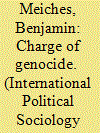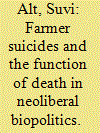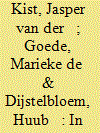|
|
|
Sort Order |
|
|
|
Items / Page
|
|
|
|
|
|
|
| Srl | Item |
| 1 |
ID:
164646


|
|
|
|
|
| Summary/Abstract |
Resilience has been widely criticized for being a neoliberal security paradigm, which causes the responsibilization of individuals while justifying the withdrawal of the state. Recently, however, more and more scholars have called for an affirmative critique beyond the dichotomy of being either for or against resilience. This article formulates such a reading of resilience by turning to controlling processes, which determine the respective potential of individuals and various societal entities to be or to become resilient. Analyzing these controlling processes represents a means to a more nuanced assessment of resilience-thinking itself. In a complex world, knowledge is both local and contextual. Emphasizing the dependence of state structures on local knowledge opens an avenue to subvert the strategic selection bias of state politics, which marginalizes those societal groups who are not able to inscribe their interests into state bureaucracies. Resilience-thinking requires fostering individuals’ capabilities to (re)act by enhancing their social and economic resources for action and by building a more inclusive society through dismantling societal barriers and impairments. The article contrasts the theoretical requirements for governing resilience with a German resilience concept in civil protection to depict the lack of theoretical substantiation of current political resilience strategies.
|
|
|
|
|
|
|
|
|
|
|
|
|
|
|
|
| 2 |
ID:
164644


|
|
|
|
|
| Summary/Abstract |
This article examines the role of racism in the development of genocide prevention and humanitarian intervention. It offers a brief history of the We Charge Genocide petition during the early 1950s. This petition demonstrated the potential for the emerging international law on genocide to challenge prevailing racial hierarchy. The movement triggered potent racialized anxieties amongst the United States and other colonial powers. Partly as a consequence of this movement, genocide was undermined as a potent international discourse. This article shows how decades later the renewed interest in genocide emerged without any sense of the connections between genocide discourse and protests against racial inequity. As a result, the antigenocide regime viewed genocide principally as a problem of state power rather than racial and colonial hierarchies. This ultimately fostered the development of a postracial regime of global governance in humanitarian institutions, which understand racial conflict as a site of political management rather than a factor in the formation of inequity and violence. The article describes how the suppression of these early struggles for racial justice depoliticized many of the sources of mass violence in the present and influenced the trajectory of practices of humanitarian intervention and genocide prevention.
|
|
|
|
|
|
|
|
|
|
|
|
|
|
|
|
| 3 |
ID:
164648


|
|
|
|
|
| Summary/Abstract |
Feminist peace research is an emerging field of social sciences that is transdisciplinary, intersectional, and normative—as well as transnational. Although it draws from disciplines such as peace and conflict research (in and outside of international relations [IR]) as well as feminist security studies, it also differs from them in terms of research scope and research design. Consequently, it not only provides insights on what can be termed “spectacular” instances of violence or peace but also sharpens our analysis of the everydayness of reconciliatory measures and the mundaneness of both violence and peace. As a feminist endeavor, feminist peace research necessarily asks questions about unequal gender relations and power structures within any given conflict environment. In this collective discussion piece, a diverse group of scholars, who formed part of the recently convened Feminist Peace Research Network, explores and further develops the parameters of this emergent field through a set of short conversation pieces.
|
|
|
|
|
|
|
|
|
|
|
|
|
|
|
|
| 4 |
ID:
164645


|
|
|
|
|
| Summary/Abstract |
The farmer suicides that have taken place in India since the 1990s constitute the largest wave of recorded suicides in human history. While existing research largely focuses on explaining the causes that lead farmers to take their own lives, this paper examines the biopolitical governing function that the suicides have. The paper argues that the farmer suicides have functioned to legitimate intervention into the lives of those who remain by either treating them as subjects with mental health problems or educating them on how to embrace a neoliberal entrepreneurial mentality. The farmer suicides arguably also function to dispose of a population that has become surplus in the contemporary developmental vision of the Indian state. Furthermore, the paper contests biopolitical theorization that views suicide or death as resistance to biopower, arguing that such theorization fails to recognize both the particularity of biopolitics in a context where the presence of death is ubiquitous and the way in which the death of some may reinforce the biopolitical governing of life of others. The farmer suicides express rather than contest the devaluation of “unproductive” lives in neoliberal capitalism.
|
|
|
|
|
|
|
|
|
|
|
|
|
|
|
|
| 5 |
ID:
164647


|
|
|
|
|
| Summary/Abstract |
Country-of-origin information has secured a central place in European asylum systems, underpinning state decisions on the asylum status of refugee populations. All European states produce this type of information, and dedicated country-of-origin information units are increasingly common. This article analyzes the knowledge politics of country-of-origin information, with a focus on the relation between knowledge and decision. We are interested in this type of knowledge precisely because it is uneasily positioned in-between social scientific methodology and policy decision-making and is infused with a “pulsional normativity.” We distinguish three phases of country-of-origin information production: first, a phase of investigation, where foreign lands are reduced to stable and mobile forms so that they can be studied as research units; second, the concordance of information production, relying on standardized instruments and practical skill; and third, the consolidation phase, which involves the return of country information constructed inside research units back into the administrative and regulatory world. The final section of the article examines how complex and frail information about countries of origin becomes deployed as valid grounds for asylum decision-making.
|
|
|
|
|
|
|
|
|
|
|
|
|
|
|
|
| 6 |
ID:
164643


|
|
|
|
|
| Summary/Abstract |
This article argues that while Foucauldian security studies (FSS) scholarship on the biopolitics of security and liberal war has not ignored racism, these works largely replicate Foucault's whitewashing of the raciality and coloniality of modern power and violence. Drawing on Black, indigenous, postcolonial and decolonial studies, we show how Foucault's genealogy of biopower rests on an unspecified concept of the “human,” failing to account for how notions of “human” were constituted through the savage and slave other, how enslaved people were rendered into things, and how punitive, sovereign violence persists as a (settler) colonial technique of gratuitous, not merely instrumental, violence. FSS exacerbates these problems. This article challenges two core FSS propositions on liberal war: 1. that “human life cannot ever be secured,” which replicates Foucault's Eurocentric reliance on an unspecified “human” as the object of biopolitics; 2. that “everyone is (potentially) dangerous” and thus open to the punitive/lethal dimensions of liberal power, which reduces racism to a sorting process after the establishment of biopolitics and liberal war, rather than a precondition of it. This “methodological Whiteness” (Bhambra 2017a) results in major oversights in FSS empirical genealogies of: state violence, twenty-first-century digital and molecular revolutions, labor, capital, and enslavement.
|
|
|
|
|
|
|
|
|
|
|
|
|
|
|
|
|
|
|
|
|